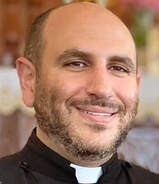Pastor's Christmas Message N.B. This message was delivered during the online 2021 Facebook special "Der Stephan's Fireside Christmas Eve. It’s that time of year again… Christmas and New Year. It is a time of year that is special… and different; sometimes complex, sometimes controversial. Sometimes crazy, sometimes even overwhelming. There are no explanations needed—you simply know what I mean! And while it’s true that this holiday “hullaballoo” will continue to visit and re-visit us perennially, there at least is an opportunity each year to cull and propagate a certain message of hope and inspiration to help us maybe make sense of a thing or two in life. Any time during the year could produce a fitting message, but it just seems to be a fact of life that the Christmas season, in all of its splendorous multichotomies, serves as the perfect wellspring for one such message. And so, across the fruited plain, in countless hamlets and villages, pastors and other religious leaders tap into this wellspring by their annual ritual of putting pen to paper, thought to written word, and producing a “Christmas message” in hopes of satisfying the need of the flock entrusted to their care. The need is simple: to figure out how the story of the birth and revelation of Jesus Christ speaks to each individual heart today. What does it mean for us today, in addition to what it meant at the time of its occurrence? The accounts of the foretelling, conception and birth of our Lord Jesus Christ are found primarily in the Gospels of Matthew and Luke. Based upon the foundation of these two narratives and leaving no stone unturned, countless hierarchs, pastors, homilists, writers and hymnographers throughout the centuries have exhibited, expounded, interpreted and re-interpreted the Christmas story using a vast array of styles and devices through a seemingly inexhaustible stream of innovation and creative powers. In addition to commentaries and expositions, there are countless novels, plays, pageants, musical compositions, motion pictures and things of the like that all strive to tell the Christmas story in a unique and novel way, each emphasizing a certain aspect or aspects of the traditional understanding of its meaning. One may emphasize the love of God revealed on Christmas, others the need for charity and love for fellow human as exhibited by Christ. Still others call attention to the very mystery of the Incarnation of the Word of God, who “became flesh and dwelt among us.” (John 1:14) Whatever the angle, we can surely count on an endless flow of Christmas messages in different media during the present and for the years and centuries to come. Yet, we can hear the Christmas story and the countless messages that accompany it thousands of times, but it will mean nothing to us if we have no response to it. What good is it if, like the above-mentioned “hullaballoo” of the season, we let the message slip by us and tuck it away in a box like all the Christmas decorations, until next year? You see, the Christmas story itself is a message and this kind of message demands a response, and the kind of response that is called for is change – something has to change in our life, in our actions, in our thinking. We must think and do something different from the way we have been thinking and doing things. Jesus Christ was born and revealed as God some 2,000 years ago, and for the most part, the world neither listened to nor responded to this message. If anything, its response was one of rejection and hatred for both the messenger and the message, resulting in the seeming defeat and death of both. In contrast, take a look at those people who did hear the message, and who did respond with a changed heart! “But as for those who received him, he gave to them – to those who would believe in his name – the authority to become children of God.” (John 1:12) “To those who received him…” “To those who would believe in his name…” This is the key here. Peoples’ lives were changed, their hearts softened and minds renewed, and through them eventually the whole world was transformed, because they heard the message of the incarnate Word of God and responded with acceptance and belief. Belief is not something dogmatic or theoretical. Belief translated into action means one thing in general: worship. Worship is the natural end of spiritual belief. Worship is the response that we see to the message of Christmas from those who truly received that message and believed Jesus as the Christ and Savior of the world. To worship God means to pour out from our hearts praise and thanksgiving in response to the great gift God has given us. Worship of Jesus Christ our Lord is the natural response of a being that has heard, comprehended and personally accepted the message of salvation brought at Christmas time. Just take a look at the examples from the story – they are numerous: Mary the Mother of God, when she heard the glad tidings from the angel at the annunciation, worshipped the Lord. Elizabeth, when she heard them from Mary, worshipped the Lord. John the Baptist, while he was still in the womb, when he merely heard Mary’s voice worshipped the Lord. “Glory to God in the highest,” sang the angels after their annunciation of glad tidings, worshipping the Lord. The shepherds, when they heard the news made the decision to go to Bethlehem, to see for themselves and to worship the Lord. The Wisemen had come in from a faraway land following a star on intuition, and when they arrived and saw what was unfolding before their eyes, their response was to worship the Lord. You can see how all of these, and countless others after them, did not remain indifferent but were profoundly transformed by their encounter with the Christ, the newborn king. They did now allow the message to become an intellectual exercise or remain just a set of historical facts. Each one made a deeply personal commitment to wholeheartedly offering their entire life to Jesus Christ as an act of worship. Likewise, we can’t let this celebration of Christmas be just a yearly reminder that some God in some place did something thousands of years ago that may or may not affect me. No, if you hear the message today that the Son of God was born in order to save you from your sins and invite you to eternal life in God’s Kingdom, now is the time to accept this message, let it change you and begin to worship the Lord on account of what he has done for YOU. In Saint Paul’s letter to the Romans we read, “I appeal to you therefore, brothers and sisters, by the mercies of God, to present your bodies as a living sacrifice, holy and acceptable to God, which is your spiritual worship” (Romans 12:1-2) God, through his loving kindness, has given you the great gift of salvation this Christmas. Accept this gift today, repent of your sins and present your body, your soul, your heart to him in worship. During this Christmas season, it is my prayer that we would all be touched once again by the message of the newborn Lord and Savior Jesus Christ, but that this would be the year that we truly let the message transform us, bring us to strong faith and conviction in his power to save, and give him the true and sincere worship of our hearts and minds. May the divine blessings of our Lord remain with you and your families during this holiday season and throughout the year. Prayerfully, Fr. Stephan Baljian, Pastor New Year & Christmas 2022
0 Comments
The parishioners of Saint Gregory Armenian Apostolic Church recently made a heartfelt donation of food items and money to the Lazarus House Ministries in Lawrence. Thanks to the generosity and charity of many parishioners, several boxes of food and small household items were collected. These items were delivered, along with a check for $500 (also thanks to generous donations), by Dn. John & Debbie Saryan.
This donation comes on the heels of another recent donation of $500 to the Artsakh telethon. We would like to thank all our parishioners who in a true spirit of Christian care and brotherhood have given of their abundance to those who are in need. |
Archives
May 2024
Categories |
Location |
SEARCH
Contact Us |


 RSS Feed
RSS Feed